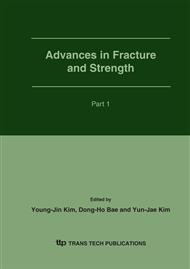p.2767
p.2772
p.2778
p.2784
p.2790
p.2795
p.2800
p.2806
p.2813
Effect of Liquid-Phase-Impact Diffusion Welding Parameters on the Strength of Welded Joints of Aluminum Matrix Composite SiCp/ZL101
Abstract:
In this paper, a new method for welding aluminum matrix composites is mainly described. It is liquid-phase-impact (LPI) diffusion welding, which has gained China National Patent. The results show that by liquid-phase-impact diffusion welding, when the certain amount of liquid phase alloy appears, with effect of certain impact speed, the interface of matrix-reinforcement and reinforcement-reinforcement are joined perfectly. Because the welding time is very short, the harmful phase is avoided in welded area and bad effect on the interface between the aluminum matrix and reinforcement hasn’t caused, and the work efficiency has improved enormously. With the technique, particle reinforcement aluminum matrix composite SiCp/ZL101 has welded successfully, and joint strength is about 75% of the strength of composite (as-casted), deformation less than 3%.
Info:
Periodical:
Pages:
2790-2794
Citation:
Online since:
November 2005
Authors:
Price:
Сopyright:
© 2005 Trans Tech Publications Ltd. All Rights Reserved
Share:
Citation:


